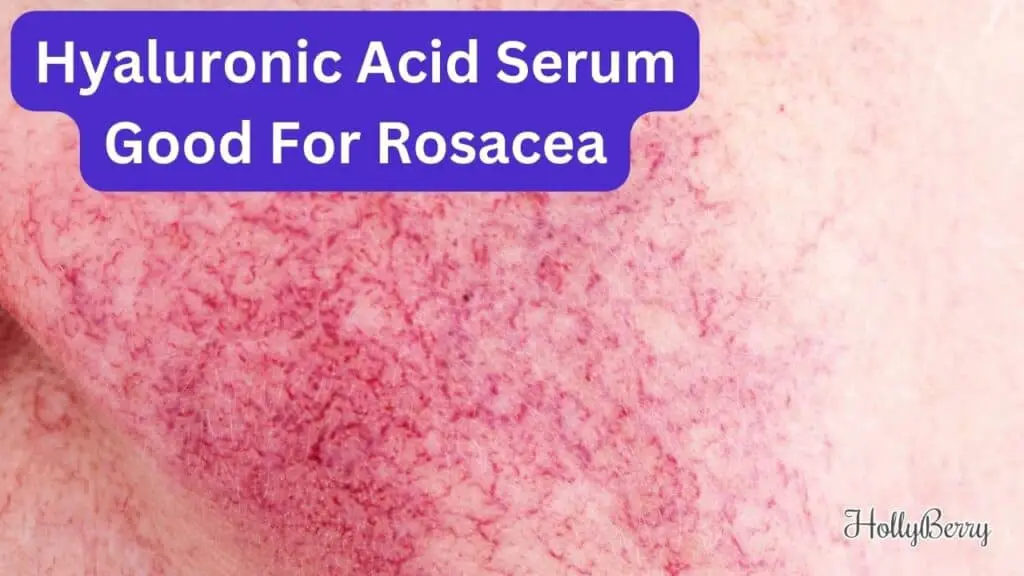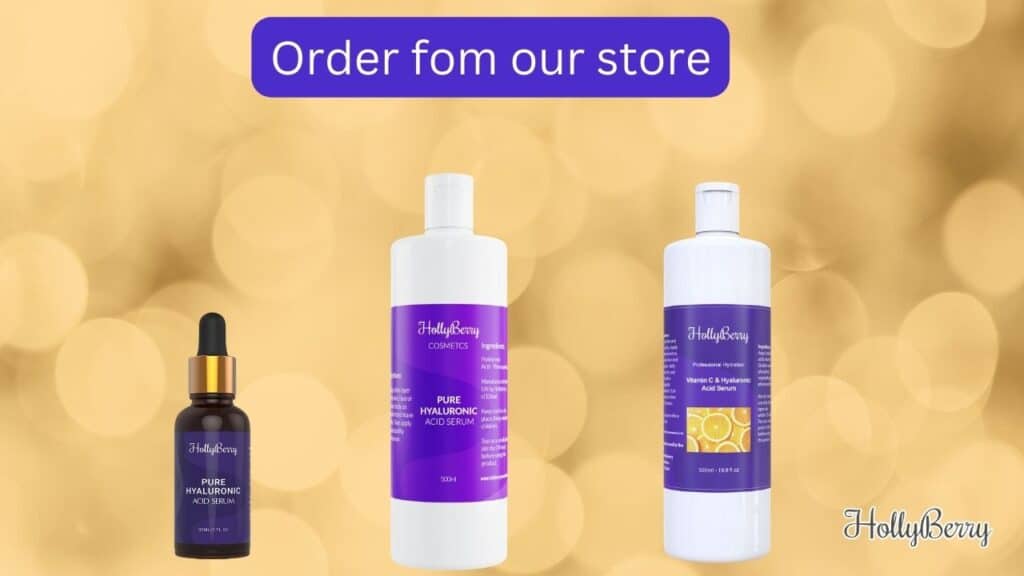
What is hyaluronic acid and how does it benefit rosacea-prone skin?
Hyaluronic acid is a naturally occurring substance found in our skin that helps to keep it hydrated and plump.
When used in a serum form, hyaluronic acid can be a great addition to a skincare routine for those with rosacea. This is because it helps to reduce inflammation, hydrate the skin and improve the overall appearance of redness and irritation. It can also be used in conjunction with other rosacea treatments for optimal results.
Another benefit of hyaluronic acid is that it can help to improve skin elasticity, which can be especially beneficial for those with rosacea-prone skin. This is because rosacea can cause the skin to become thin and fragile, so anything that can help to strengthen and protect the skin is always a plus!
Overall, hyaluronic acid is a great ingredient to look for in skincare products if you have rosacea-prone skin, as it can help to improve the overall appearance and health of your skin!
How does hyaluronic acid help to reduce inflammation associated with rosacea?
Hyaluronic acid is known for its ability to reduce inflammation and redness in the skin, which is why it can be especially helpful for those with rosacea-prone skin.
One way that hyaluronic acid can help to reduce inflammation is by hydration. Hyaluronic acid also has anti-inflammatory properties, which can help to soothe irritated skin and reduce redness. This makes it an effective ingredient for those with rosacea who are looking to reduce inflammation and improve the overall appearance of their skin.
Can hyaluronic acid be used in conjunction with other rosacea treatments?
Yes, hyaluronic acid can definitely be used in conjunction with other rosacea treatments! In fact, it can be a great addition to your current skincare routine as it can help to enhance the effectiveness of other treatments.
Hyaluronic acid can be used alongside other skincare ingredients that target rosacea, such as antioxidants and anti-inflammatory agents. It can also be used alongside other topical or oral medications prescribed by a dermatologist for rosacea.
It’s always a good idea to consult with your dermatologist before adding any new skincare products to your routine if you have rosacea, but incorporating our hyaluronic acid serum can be a gentle and effective way to improve the appearance of rosacea-prone skin.
It’s also worth noting that since hyaluronic acid is a gentle and non-irritating ingredient, it can be used by all skin types, so you can use it even if you have sensitive skin and you’re using other rosacea treatments that are more active.
How to choose a hyaluronic acid serum that is suitable for rosacea-prone skin?
Choosing a hyaluronic acid serum that is suitable for rosacea-prone skin is important to ensure that it will be gentle and effective on your skin. Here are a few things to keep in mind when choosing a hyaluronic acid serum for rosacea-prone skin:
Look for a serum that is formulated for sensitive skin: Rosacea-prone skin is often sensitive, so it’s important to choose a serum that is specifically formulated for sensitive skin.
Avoid ingredients that can irritate skin: Some ingredients, such as fragrances, alcohol or essential oils, can be irritating to the skin. So, it’s best to avoid serums that contain them.
Check the concentration of hyaluronic acid: Serums can have different concentrations of hyaluronic acid, so it’s important to check the label to make sure you’re getting a product that contains an appropriate amount of hyaluronic acid for your skin type.
Consider the packaging: hyaluronic acid is sensitive to light and air, so you might want to choose a serum that comes in an airtight, opaque container to keep the ingredients fresh.
Patch test: Before applying the serum to your face, it’s always a good idea to do a patch test on a small area of your skin to make sure you don’t have any adverse reactions.
By keeping these things in mind, you can choose a hyaluronic acid serum that is suitable for rosacea-prone skin and can be an effective addition to your skincare routine.
Order our hyaluronic acid from our store here

How to use hyaluronic acid serum for best results on rosacea-prone skin?
if you have rosacea-prone skin. Here’s how to use it for the best results:
Cleanse your skin: Start by cleansing your skin to remove any dirt, oil, or makeup. This will ensure that the serum can penetrate your skin properly.
Apply the serum: After cleansing, apply a small amount of the hyaluronic acid serum to your face and neck. You can use your fingers or a cotton pad to apply it.
Pat it in: Gently pat the serum into your skin, rather than rubbing it in. This will help it to absorb more effectively.
Follow with moisturizer: After applying the serum, follow up with a moisturizer to lock in the hydration and to keep your skin moisturized.
Apply sunscreen: Sun protection is crucial when you have rosacea-prone skin, so make sure to apply sunscreen in the morning before you go out.
Incorporate it into your routine: Use the serum regularly as part of your skincare routine, ideally morning and night.
It’s also important to remember that as with any skincare product, consistency is key. Give it some time to see the results, it may take a few weeks for the full benefits to be seen.
And remember, always patch test before using any new product, even if it’s formulated for sensitive skin, and consult with your dermatologist if you have any doubts or concerns.
Q and A – Common questions about Rosacea
What is rosacea and what are the common symptoms?
Rosacea is a chronic skin condition that causes redness, inflammation, and visible blood vessels on the face. Common symptoms include flushing, redness, bumps, and pimples.
What causes rosacea and is there a cure?
The exact cause of rosacea is unknown, but it is thought to be a combination of genetic and environmental factors. There is currently no cure for rosacea, but it can be managed with proper treatment.
Can rosacea be treated and if so, what are the treatment options?
Rosacea can be treated with a variety of options including topical creams and gels, oral medications, and laser or light-based therapy.
Is rosacea contagious or can it be spread to others?
Rosacea is not contagious and cannot be spread to others.
How can I prevent rosacea flare-ups?
To prevent rosacea flare-ups, it is important to avoid triggers such as sun exposure, alcohol, spicy foods, and hot temperatures.
Can certain foods or lifestyle habits trigger rosacea?
Certain foods and lifestyle habits such as alcohol consumption, spicy foods, hot temperatures, and sun exposure can trigger rosacea flare-ups.
Can rosacea lead to more serious skin conditions?
Left untreated, rosacea can lead to more serious conditions such as ocular rosacea (affecting the eyes) and rhinophyma (an enlarged nose).
Are there any natural remedies that can help with rosacea?
Some natural remedies that may help with rosacea include aloe vera, green tea, and chamomile. However, it’s important to consult with a dermatologist before trying any new remedies as they may interact with other treatments or make the condition worse.


